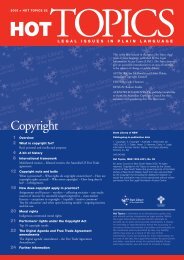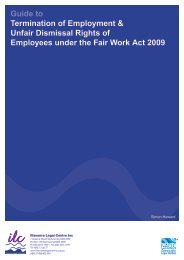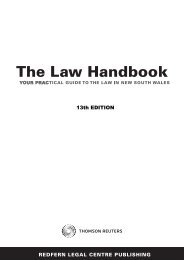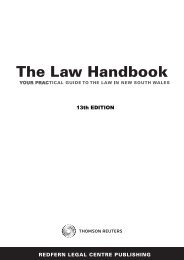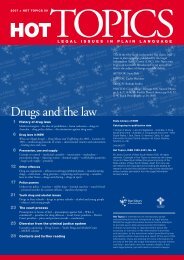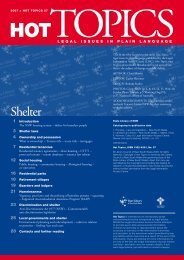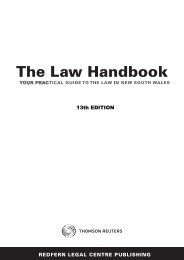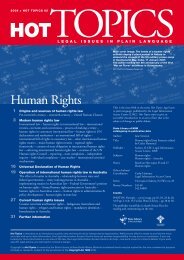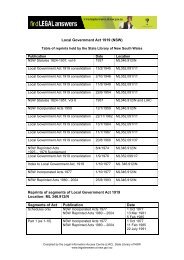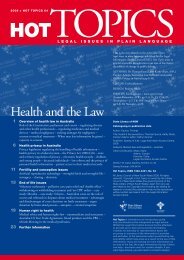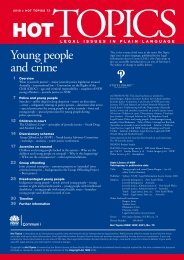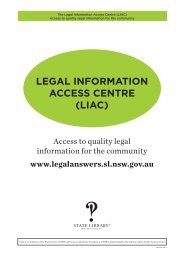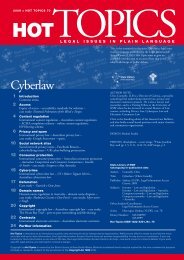Terrorism - Hot Topics 58 - Legal Information Access Centre
Terrorism - Hot Topics 58 - Legal Information Access Centre
Terrorism - Hot Topics 58 - Legal Information Access Centre
- No tags were found...
You also want an ePaper? Increase the reach of your titles
YUMPU automatically turns print PDFs into web optimized ePapers that Google loves.
1914 (Cth)). An organisation can be banned if it has a seditious intention to, by force or violence:> bring the Sovereign into hatred or contempt;> urge disaffection against the Constitution, federal Government or Parliament;> urge another person to unlawfully change any matterestablished by law; or> promote feelings of ill-will or hostility betweendifferent groups so as to threaten the peace, order andgood government of the Commonwealth.This power additional to the new power to list terroristorganisations, but has similar effects, with criminalpenalties for being a member, leader, representative orteacher in the association, for giving money or goodsto it, allowing it to meet in a person’s premises, or forpublishing or selling publications of the association. Inaddition, all of the assets of the organisation are forfeitedto the government.The problem is that this old definition of sedition is evenwider and more ambiguous than the definition usedfor the new sedition offences. It is hard to know whatit means to bring the Queen into contempt or to urge‘disaffection’ against the government. As mentionedearlier, the purpose of the old law of sedition was toprotect the monarchy from criticism at a time whendemocratic institutions and freedom of speech were notfully protected. The powers to ban terrorist organisationsare drafted in a more precise and modern way whichavoids these problems, and they are arguably sufficientto combat political violence by groups, without the needfor the additional power to ban unlawful associations.Historically, banning unlawful associations has beenalmost as controversial as sedition itself, since the powerwas used against trade unionists during industrial unrestin the past.OTHer prOvisiOns Of THe anTi-TerrOrism aCT (no. 2) 2005Other parts of the new anti-terrorism laws have alsoraised concerns. A new offence of recklessly financingterrorism – even in the absence of an intention tofinance – extends criminal liability too far and makes itimpossible for any person to know the scope of their legalliabilities with any certainty, such as whether it is lawfulto donate to a charity or religious group. The Act triplesthe length of some ASIO search warrants, inviting theauthorities to conduct fishing expeditions over extendedperiods where there is insufficient evidence of terroristactivity. Finally, the Act allows certain AFP officers toissue a written notice on a person to produce certaininformation related to terrorism investigations – butwithout the approval of a magistrate (which is normallyrequired before a search warrant can be issued to collectevidence). It thus lessens the protections and supervisionusually available in criminal investigation.anTi-TerrOrism laws in nswIn April 2002, state governments referred theirconstitutional powers over terrorism offences to theCommonwealth, following a Summit of Commonwealthand state and territory leaders (see, for example, the<strong>Terrorism</strong> (Commonwealth Powers) Act 2002 (NSW)and the Criminal Code Amendment (<strong>Terrorism</strong>) Act 2003(Cth)). This was necessary to ensure that the federalgovernment had sufficient constitutional powers toenact uniform federal criminal laws against terrorism,since most criminal laws are usually a matter for thestates. Some states have, however, enacted their ownadditional anti-terrorism laws in various areas. In NSW,for example, new laws give police new anti-terrorismpowers, create a presumption against bail for terrorismoffences, and allow for the issue of preventive detentionorders as part of a complementary Commonwealth-statescheme.Below is a list of the major anti-terrorism laws adoptedin NSW, which complement the many Commonwealthlaws that apply in NSW.> <strong>Terrorism</strong> (Police Powers) Amendment (Preventative Detention) Act 2005> Crimes Act 1900 – Part 6B (membership of a terrorist organisation)> Listening Devices Act 1984 – section 16> <strong>Terrorism</strong> (Commonwealth Powers) Act 2002> <strong>Terrorism</strong> (Police Powers) Act 2002 and Regulation 2005> Bail Act 1978 – section 8A> Freedom of <strong>Information</strong> Act 1989 (documents affecting counter-terrorism measures)> Workers Compensation Act 1987 (<strong>Terrorism</strong> Re-Insurance Fund)australian anti-terrorism laws 27



